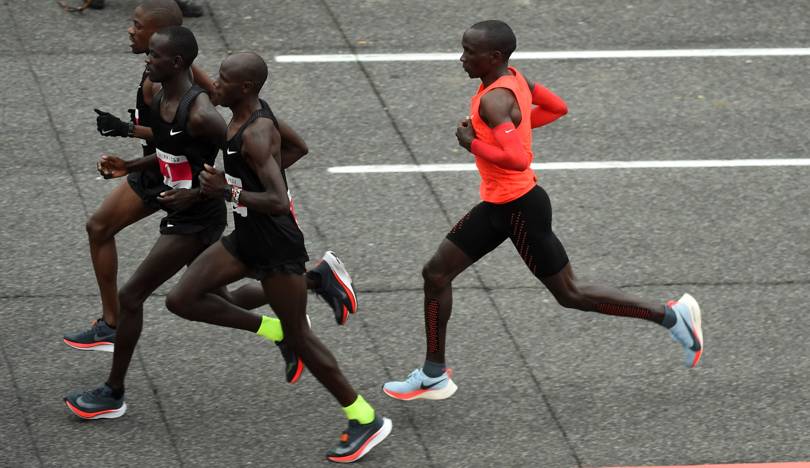Not just in the recent time.
But the greatest marathon runner in history.
On Sunday, September 16, 2018, Eliud Kipchoge made history, again, at the 45th Berlin Marathon. He is the first person ever to run a marathon in under 2 hours and 2 minutes.
His time, an astonishing 2 hours, 1 minute and 39 seconds broke the former record by almost 1 minute and 20 seconds.
Running at an average pace 2 minutes 83 seconds per kilometre, is simply astounding for 42.2 km. I cannot even sustain that pace for 1 km, even when I was running slightly under 3 hours for the race.
Even on a treadmill, that pace is astounding.
So, how fast can marathoners really go? From the first officially recorded win in 1908, at 2 hours 55 minutes, to Eliud's time of 2 hours 2 minutes (if you just round the numbers), you have a increase in performance of 53 minutes.
In a little over a hundred years, 53 minutes have been knocked off the marathon. And the next challenge is to see if a human being can run in under 2 hours.
Back to Eliud.
In May 2017, Nike organised a run on a track with three marathoners to see if the marathon 2 hour barrier could be broken.
The event was aptly named Breaking2.
Eluid Kipchoge was in that race and ran the marathon, on the track, in 2 hours and 25 seconds. He was only 25 seconds short of breaking the mark.
The race was not an official marathon race because of many factors. The runners were paced by different pace runners, coming in and out of the race. There was even a pace car. Fluids were handed to the runners, while in a regular marathon, the runners have to get to the water stops and pick up their water bottles off a table - sometimes missing them.
What did we learn from Breaking2?
 |
| Wall of pace runners protecting Eliud during Breaking2 |
David Epstein, the author of "The Sports Gene" had a very interesting TED talk titled, "Are athletes really getting faster, better, stronger?" It's an interesting take on sports and performance. While there is an allusion to the possibility of various forms of enhancement, he sticks to the fact that the human body has evolved. His book, "The Sports Gene," presents a denser academic version of that talk.
Eliud Kipchoge is the greatest marathoner in history. He's run 11 marathons and only lost one (he came second to Wilson Kipsang who broke the world record to beat him).
Eliud Kipchoge is a great ambassador for Kenya, and stands uniquely among those athletes who are true heroes. Soft spoken, intelligent, determined and extremely dedicated to the sport that the world has come to know him for.
Eliud Kipchoge is my hero, and he inspires me to get out and run.

